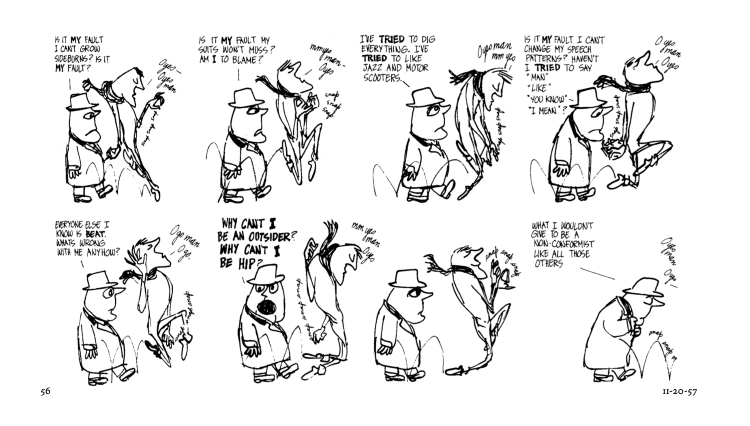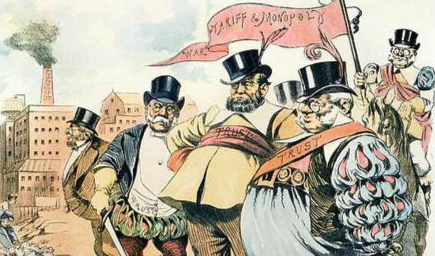Feiffer Friends & Fans Flashback
Skip to commentsThe death of famed cartoonist Jules Feiffer was international news. But we would like to recommend those obituaries prepared and issued by the comics community.

Jules Feiffer mastered every major narrative art form of the 20th century — comic strips (Feiffer), theater (Little Murders), cinema (Carnal Knowledge), novels (Harry the Rat with Women), graphic novels (Tantrum), children’s literature (Bark, George) — and he used them to capture our every neurosis, desire, fear, hypocrisy, fantasy, rationalization and twisted daydream. He was also capable of painting beautiful watercolor renditions of dancers fixed in the fluidity of a moment, but his true genius emerged when his figures were prodded into motion, dancing or walking or talking — especially talking — from panel to panel until their stories were told. His own seemingly unceasing movement was brought to an end by congestive heart failure on Jan. 17, 2025 at the age of 95.
His affinity for visual storytelling seized him at an early age. Neither athletic enough to join the neighborhood boys roughhousing and stickballing in the street nor brainy enough to earn accolades at school, Feiffer preferred to stay in his room communing with Captain Easy, Flash Gordon and Superman. “Comics: I ate them, I breathed them, I thought about them day and night.” He wrote in his 2010 autobiography Backing into Forward. “I learned to read only so I could read comics.”
MIchael Dean, for The Comics Journal, does an outstanding job covering Jules Feiffer career.

A groundbreaking satirical cartoonist, playwright, and screenwriter, Feiffer was also arguably best known for illustrating the children’s fantasy book The Phantom Tollbooth (by Norton Juster, pictured above, to Feiffer’s left.)
Feiffer won an Oscar for his animated short Munro and was later nominated for several Writer’s Guild of America awards for screenplays including Carnal Knowledge and Little Murders. He was a Tony and Obie award nominee for his plays, and won a Pulitzer Prize for his comics, as well as lifetime acheivement awards from the National Cartoonist Society and the Eisner Awards. Feiffer was truly a creator who spanned mediums and made an impact in all of them.
The (Comics)Beat published Luke Cornelius’ much more concise, but still appreciative, notice.
Friends and Fans are remembering the cartoonist.

Jules Feiffer, 95, my comics mentor and socio-satiric hero, died yesterday at his home near Cooperstown, NY, where he and his wife, Joan, lived. I knew by the laws of nature that he didn’t have a lot of time left. So I jumped at the chance to speak to him on Zoom this past fall; he was happy, funny and sharp, and he thanked me for having contributed greatly to his 25th-anniversary cartoon anthology, Jules Feiffer’s America: From Eisenhower to Reagan. I published our exchange here, and prior to that I randomly wrote an appreciation not pegged to any newsworthy event, just a showing of affection for him.
Feiffer’s art (and writing) was what made me want to become a cartoonist—a goal I never attained…
Steven Heller, at Print, remembers his friend and inspiration.

This isn’t a column about Jules Feiffer’s biography and accomplishments, although these are manifold. He’s the only person—ever—to win the Pulitzer, the Emmy, and the Oscar.
Imagine how talented you’d have to be to do that.
I knew Jules in passing, and one of the things I would often repeat to myself later was “Jules Feiffer knows who I am,” and I can insert fifty other artist’s names and get the same holy shit sensation—but it was marvelous to me that I was acquainted with him.
Jules was quite friendly and accessible.
Fan and friendly acquaintance Jack Ohman reminisces.

1. Launched Alt Weekly Comics
The origin story for alt-weekly comic begins in 1956, when 27-year-old Jules Ralph Feiffer, fresh from apprenticing with cartoonist Will Eisner and serving a stint in the Army, was hitting the pavement of New York City, looking up publishers, trying to catch a break. He believed himself to be in a professional Catch-22: His work was too offbeat to publish without a famous name, and he’d never get that famous name if he never got published.
Finally, he walked into the offices of an upstart new publication called The Village Voice, then in its first year. Here, his work was embraced. Sure, he wouldn’t get paid, at least at first, but “Sick Sick Sick,” later retitled “Feiffer,” was launched.
Comics historian Michael Tisserand enumerates “Ten ways that Jules Feiffer changed comics and culture.”

My friend — our friend, speaking for uncountable cartoonists; fans of cartoons and comics; theatergoers; booklovers; political junkies; historians; animation fans; pop-culture aficionados; satirists; thinkers who like to laugh and laughers who like to think — Jules Feiffer has died. He was weeks away from his 96th birthday. Even with those accumulated years, he packed much more creativity and notable achievements than many such lifespans could hold.
I will gather some memories I recently shared, and call up others. For a while I was Feiffer’s editor — not that he needed or wanted an editor; the syndicate where I worked distributed his weekly cartoon, so my job, basically, was to savor his work a few days earlier than the general public, that’s all.
Comic editor and friend Rick Marschall remembers.

Brilliant cartoonist, author, and playwright Jules Feiffer passed away last Thursday, a little over a week before his 96th birthday.
Growing up, I mostly got to see his cartoons when I came across a copy of the Sunday Chicago Sun-Times, which ran his work in their newsmagazine supplement. It wasn’t the paper we got at home, but if I spotted one a neighbor had put out for recycling, I would salvage the magazine and clip out Feiffer’s cartoon.
Eventually, I found his books
Long time fan cartoonist Paul Berge pays homage.

I don’t have any cool stories or anecotes about Jules Feiffer, but in memory of his passing this week, I thought I might share a very-much-not-random selection of his comics that are still very-much-not-irrelevant today.
Fan Sean Kleefeld shares some evergreen Feiffer comic strips.

As part of our homage to the mighty Jules Feiffer, who died of congestive heart failure on Jan. 17, 2025 at the age of 95, we thought we’d highlight a few articles and interviews from our back pages, so to speak.
Back to The Comics Journal where they recall past meetings with Jules Feiffer.


Comments 4
Comments are closed.